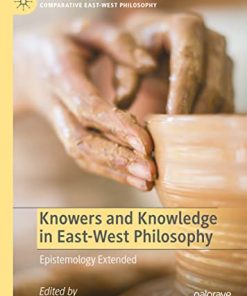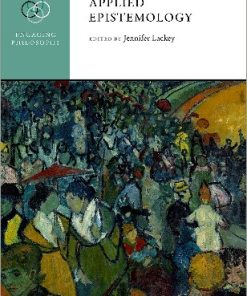(Ebook PDF) Socially Extended Epistemology 1st edition by Adam Carter, Andy Clark, Jesper Kallestrup 019252190X 9780192521903 full chapters
$50.00 Original price was: $50.00.$25.00Current price is: $25.00.
Socially Extended Epistemology 1st edition by J. Adam Carter, Andy Clark, Jesper Kallestrup – Ebook PDF Instant Download/DeliveryISBN: 019252190X, 9780192521903
Full download Socially Extended Epistemology 1st edition after payment.

Product details:
ISBN-10 : 019252190X
ISBN-13 : 9780192521903
Author : J. Adam Carter, Andy Clark, Jesper Kallestrup
Socially Extended Epistemology explores the epistemological ramifications of one of the most important research programmes in contemporary cognitive science: distributed cognition. In certain conditions, according to this programme, groups of people can generate distributed cognitive systems that consist of all participating members. This volume brings together a range of distinguished and early career academics, from a variety of different perspectives, to investigate the very idea of socially extended epistemology. They ask, for example: can distributed cognitive systems generate knowledge in a similar way to individuals? And if so, how, if at all, does this kind of knowledge differ from normal, individual knowledge? The first part of the volume examines foundational issues, including from a critical perspective. The second part of the volume turns to applications of this idea, and the new theoretical directions that it might take us. These include the ethical ramifications of socially extended epistemology, its societal impact, and its import for emerging digital technologies.
Socially Extended Epistemology 1st Table of contents:
Part I. Foundational Issues within Socially Extended Epistemology
1. How far can Extended Knowledge be Extended?: The Asymmetry between Research Teams and Artifacts
1.1 From Extended Cognition to Extended Knowledge
1.2 The Social Epistemology of Science
1.3 An Excursion into the Real World of Science
1.4 Concluding Remarks
2. Outsourcing Concepts: Social Externalism, the Extended Mind, and the Expansion of our Epistemic Capacity
2.1 Externalism, Passive and Active
2.2 The Metalinguistic Account
2.3 Extended Cognition and the How Question: Outsourcing Concepts
2.4 Extended Cognition and the Why Question: Expanding our Epistemic Capacity
2.5 Conclusion
3. Representations and Robustly Collective Attitudes
3.1 Groups with Attitudes
3.2 Group Belief
3.3 Against Robustly Collective Attitudes
3.4 Do Attitudes Require Representations?
3.5 In Defense of Collective Representations
3.6 Objections and Replies
3.7 Conclusion
4. Mind Outside Brain: A Radically Non-Dualist Foundation for Distributed Cognition
4.1 Introduction
4.2 From Dualism to Action Ontology
4.3 Agents and the Intentional Stance
4.4 Panpsychism and the Theory of Mind
4.5 Organizations
4.6 Socially Distributed Cognition
4.7 Experiencing Non-Duality
4.8 Conclusion
5. Practical Knowledge and Acting Together
5.1 Introduction
5.2 Distributive Joint Practical Knowledge
5.3 Joint Decisions and Practical Knowledge
5.4 Collective Joint Practical Knowledge
5.5 Conclusions
6. Group Know-How
6.1 Introduction
6.2 Recent Debates about Know-How
6.3 Reducing G-KH
6.4 An intellectualist approach to G-KH
6.5 An Anti-Intellectualist Approach to G-KH
6.6 Is G-KH Intellectualist, Anti-Intellectualist, or Both?
6.7 Conclusion
7. Consensus as an Epistemic Norm for Group Acceptance
7.1 Introduction
7.2 Group Intentionality: Preliminary Definitions
7.3 Are Individual and Collective Attitudes of the same Kind?
7.4 An Alternative Rejectionist Proposal: Accepting Under Consensus
7.5 Epistemological Implications
Part II. Applications and New Directions
8. Socially Extended Moral Deliberation about Risks: A Role for Emotions and Art
8.1 Introduction
8.2 Risk and Ethics
8.3 Risk and Moral Emotions
8.4 Art, Risk, and Emotion
8.5 Techno Art as a Source of Socially Extended Knowledge: Setting out a Research Agenda
8.6 Conclusion: Techno Art, Emotions, and Socially Extended Knowledge in Debates About Risk
9. Thinking Together about Genocide: Socially Shared Cognition in Context
9.1 How Psychologists Have Grappled with Social Cognition
9.2 Core Configurations of Human Social Life
9.3 Dyads: Dynamic Coupling, Joint Attention, and Collaborative Learning
9.4 Small Work/Family Groups: Distributed Cognition
9.5 Bands and Macrobands: Shaping Shared Realities
9.6 Final Thoughts
10. Collective Amnesia and Epistemic Injustice
10.1 Human Biological Memory
10.2 Shared and Collective Memories
10.3 Scaffolded Cognition
10.4 Ignorance as an Achievement
10.5 Collective Amnesia
10.6 Intellectual Self-Trust, Collective Memories, Collective Amnesia
10.7 Memorial Injustice
11. The “Ontological Complicity” of Habitus and Field: Bourdieu as an Externalist
11.1 Introduction
11.2 Overview of Bourdieu’s Theoretical Framework
11.3 Bourdieu and Cognitive Externalism
11.4 Bourdieu and Epistemic Externalism
11.5 Conclusion
12. Mandevillian Intelligence: From Individual Vice to Collective Virtue
12.1 Introduction
12.2 Virtue Epistemology: Reliabilism, Responsibilism, and Virtue Relativism
12.3 My Vice, Our Virtue
12.4 Implications
12.5 Conclusion
13. Solving the Frame Problem Socially
13.1 Introduction
13.2 Extended Knowledge Redux
13.3 The Frame Problem of Knowledge Engineering
13.4 Solving the Frame Problem Socially
13.5 Conclusions: Socially Extended Knowledge, Justification, and Autonomy
People also search for Socially Extended Epistemology 1st:
what is social epistemology
is social constructionism an epistemology
what is a social constructivist epistemology
social epistemology examples
social epistemology sep
Tags:
Socially Extended,Socially,Epistemology,Adam Carter,Andy Clark,Jesper Kallestrup
You may also like…
Crime
(Ebook PDF) The New Neighbor 1st edition by Carter Wilson isbn 978-17282475261728247527full chapters
Politics & Philosophy - Asian Philosophy
Politics & Philosophy - Anthropology
Learning from Our Mistakes: Epistemology for the Real World William J. Talbott
Uncategorized
PreTest Emergency Medicine 1st edition by Adam Rosh, Ciara Barclay Buchanan 126046895X 9781260468953
Politics & Philosophy - Anthropology
Uncategorized
Uncategorized
(EBook PDF) The Dead Husband 1st edition by Carter Wilson 1728225094 9781728225098 full chapters












